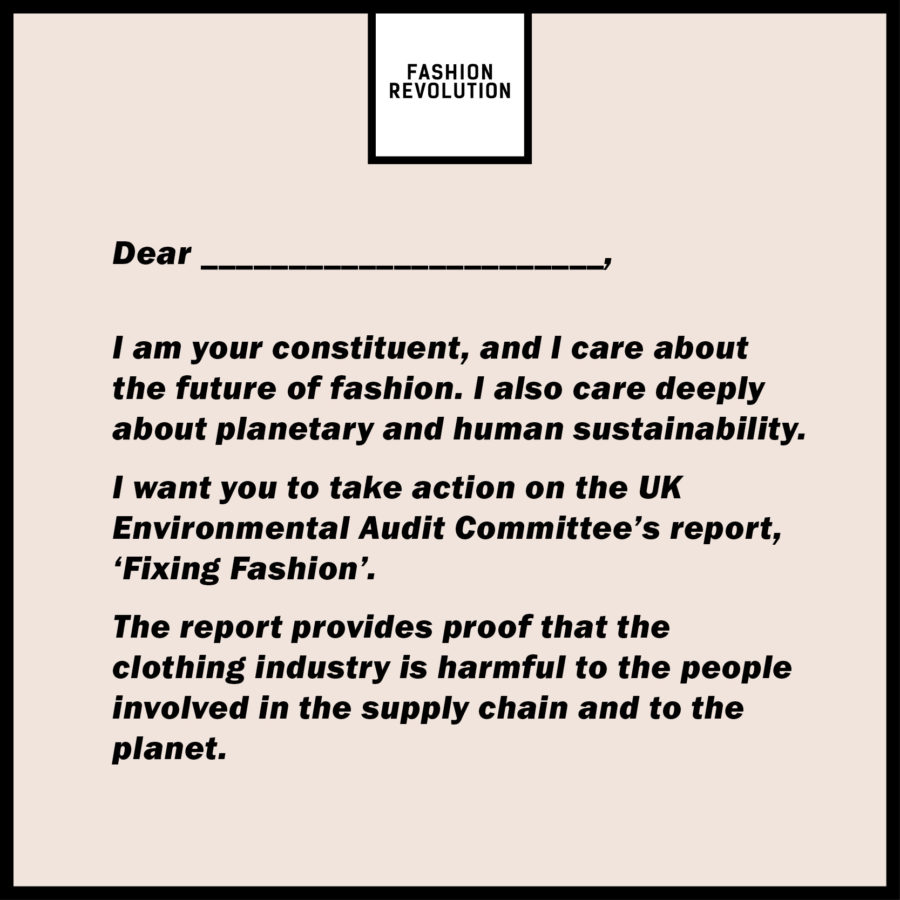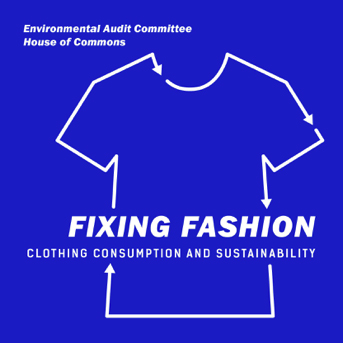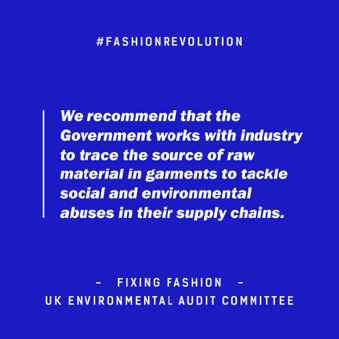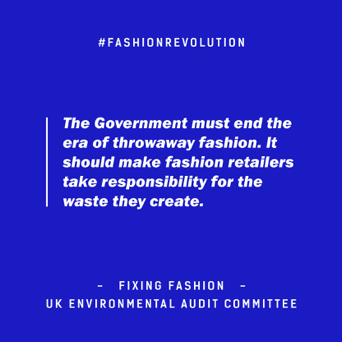Fashion Revolution Statement on House of Commons Environmental Audit Committee Report: Fixing Fashion
In June 2018 the Environmental Audit Committee launched an inquiry into the Sustainability of the Fashion Industry.
They wrote to sixteen leading UK fashion retailers asking what they are doing to reduce the environmental and social impact of the clothes and shoes they sell. Today they release their Final Report: Fixing Fashion: Clothing Consumption and Sustainability. Within the report are key recommendations that the EAC hopes parliament will pass into law. As the report clearly states “the fashion industry has marked its own homework for too long”.
Fashion Revolution welcomes the UK Environmental Audit Committee’s findings of their inquiry into the sustainability of the fashion industry. We too want to see a thriving fashion industry in the UK that employs people, inspires creativity and contributes to sustainable livelihoods in the UK and around the world and we believe that brands and retailers have an obligation to address the fundamental business model. We believe that the fashion industry in the United Kingdom and globally needs far reaching systemic change in order to tackle poverty, inequality and environmental degradation and greater transparency is the first crucial step towards solving its human rights and environmental crises.
“Fashion Revolution was a key contributor to this report, giving evidence to the EAC to help guide their understandings of the scope of the fashion industry and suggest policy decisions that would bring about wide scale change. Through Fashion Revolution tools like the Fashion Transparency Index, our manifesto, and our resources on microfibres, modern slavery and garment repair, we are excited to see the EAC follow through with some of our most critical demands. We hope to see the policymakers and citizens across the UK work hard to make sure that these recommendations are adopted into policy” said Policy Director Sarah Ditty.
The committee makes a number of recommendations in its final report.
We recommend that the Government strengthen the Modern Slavery Act to require large companies to ensure forced labour is not in their supply chains. Retailers including Foot Locker and Versace are failing to comply with the Modern Slavery Act. Company law must be updated to require modern slavery disclosures by 2022. Companies must report, or face a fine.
Fashion Revolution agrees that the Modern Slavery Act 2015, and specifically section 54, is an important piece of legislation for progressing greater transparency in the fashion industry (amongst other sectors) but its scope and implementation is too limited. Our recommendation would be to begin by strengthening the U.K. Modern Slavery Act transparency requirements through a variety of actions, including but not limited to:
- Extending the legislation to cover public procurement;
- Establishing, maintaining and monitoring an easily searchable public database of companies that are required to comply, including a copy of their annual MSA statements;
- Establish and require common, robust and comparable standards for reporting transparency information;
- Establish and enforce penalties for companies that do not comply.
We also want the U.K. Government to pass mandatory due diligence laws, building upon the recent regulatory examples in France and Switzerland.
Mandatory environmental targets for fashion retailers with a turnover above £36 million
While we are seeing brands begin to publish more about their social and environmental efforts, which is welcome and necessary, there is still much crucial information about the practices of the fashion industry that remains concealed, particularly when it comes to brands’ tangible impact on the lives of workers in the supply chain and on the environment.
Our Fashion Transparency Index research has shown that some major brands and retailers are making significant efforts to tackle these issues in their companies and across their supply chains, whilst at the same time far too many large brands and retailers are turning a blind eye. Fashion Revolution’s Fashion Transparency Index 2018 found that only 55% of the 150 brands and retailers surveyed were publishing measurable, time-bound goals on improving environmental impacts. We need universal, industrywide accountability standards. At present, we still have no way of knowing if brands policies and procedures are truly effective and are driving improvements for the people making our clothes.
In a Ipsos Mori survey of 5,000 people across the five largest EU markets published by Fashion Revolution in November 2018, 75% of people surveyed said brands should protect the environment at every stage of making their products. Yet, most brands still have very marginal positive impact, particularly on the lowest levels of their supply chain where the raw materials are grown and processed.
A new Extended Producer Responsibility (EPR) scheme to reduce textile waste with a one penny charge per garment on producers
Waste is one of the most pressing issues in the fashion supply chain, exemplified by recent media exposés showing Burberry and H&M burning unsold stock and reports of the growing number of microplastics polluting our oceans. Estimates say that only 20% of textiles are recycled globally, which means 80% end up in landfill or incinerated. The UK government must act urgently to deal with fashion’s escalating waste problem. These waste and recycling solutions suggeste by the Committee will, in turn, help tackle climate change too — a win-win.
We recommended at the beginning of the government’s inquiry into the fashion industry that the UK should follow France’s lead and pass Extended Producer Responsibility legislation — requiring manufacturers, importers, distributors and brands across the UK to be responsible for the products they make or sell, and any associated packaging, when they become waste. This will create a much-needed financial incentive for companies to reduce waste both within the production process and at the end of the life of the products they sell. Extended Producer Responsibility schemes require the producer to pay an upfront fee proportional to how much product they place on the market, and this levy helps fund the collection and recycling infrastructure needed. There are actually around 400 EPR schemes around the world, including the France example and the WEEE directive for electronics waste in the EU, so this type of legislation isn’t novel, it’s just common sense.
The penny per item charge will be a significant cost to the major value retailers that rely on selling cheap products in huge volumes. This is exactly the type of incentive we need in order to help curb rampant overproduction and overconsumption without putting all the blame on consumers.
The Government should reform taxation to reward fashion companies that design products with lower environmental impacts. This could include extending the proposed tax on virgin plastics to synthetic textile products to stimulate the market for recycled fibres in the UK.
The report warns that although some parts of the fashion industry are making progress in reducing their carbon and water consumption, these improvements have been outweighed by the increased volumes of clothing being sold. Plastic production is expected to quadruple by 2050, which means that even with the best possible global recycling rate, the amount of plastic polluting the environment would still double. The report concludes that a voluntary approach to improving the sustainability of the fashion industry is failing with just 11 fashion retailers signed up to reduce their water, waste and carbon footprints.
In last year’s Fashion Transparency Index a quarter of the brands and retailers were disclosing investments in circular, closed-loop resources and technologies with the aim to reduce resource consumption and increase resource efficiency — up from 14% last year.
In the 2019 index, due out in April and covering 200 brands, we will be expanding the questions on waste to dig down deeper into what brands are doing to design products with lower environmental impacts, such as whether they disclose targets for the reduction of the use of virgin plastics, or publishes what % of annual product volume is made using conventional/virgin materials verses more sustainable materials.
We are in agreement that the proposed tax on virgin plastics in 2022 should certainly be applied to all textile products that contain less than 50% recycled PET. Currently, over 60% of the world’s PET production is for synthetic fibres (polyester).
The report calls on the Government to use the tax system to shift the balance of incentives in favour of reuse, repair and recycling to support responsible fashion companies.
Fashion Revolution welcomes the suggested use of the tax system to incentivise fashion brands and retailers with a more responsible approach. In last year’s Fashion Transparency Index, just 6% of brands (9 out of 150) were offering repair services to help extend the life of their products so we clearly have a long way to go in this regard.
It is clear that greater government intervention will be necessary if companies are to be held to account for the impacts of their practices on people’s lives and the environment. Rewriting the tax system is a good start, but ultimately, if the Government is serious about improving human rights, social impacts and environmental sustainability in the fashion industry, it must go further than this and rewrite the rules of the economy so that shareholder profit is no longer prioritised above the protection of our ecosystems and the health and wellbeing of our communities.

If you want to see the recommendations of the Environmental Audit Committee and Fashion Revolution acted upon, take action and write a postcard to a policy maker!















